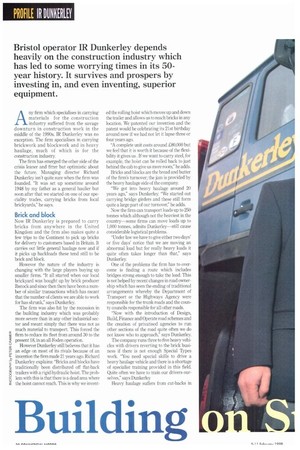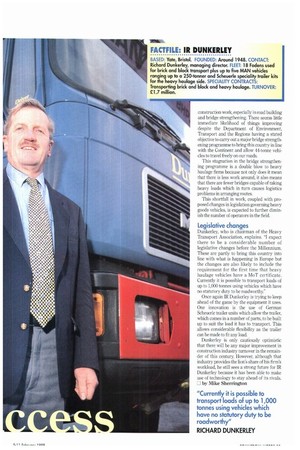PROFILE IR RINKERLEY
Page 40

Page 41

If you've noticed an error in this article please click here to report it so we can fix it.
Bristol operator IR Dunkerley depends heavily on the construction industry which has led to some worrying times in its 50year history. It survives and prospers by investing in, and even inventing, superior equipment.
Any firm which specialises in carrying materials for the construction industry suffered from the savage downturn in construction work in the middle of the 1990s. IR Dunkerley was no exception. The firm specialises in carrying brickwork and blockwork and in heavy haulage, much of which is for the construction industry.
The firm has emerged the other side of the crisis leaner and fitter but optimistic about the future. Managing director Richard Dunkerley isn't quite sure when the firm was founded. "It was set up sometime around 1948 by my father as a general haulier but soon after that we started on one of our speciality trades, carrying bricks from local brickyards," he says.
Brick and block
Now IR Dunkerley is prepared to carry bricks from anywhere in the United Kingdom and the firm also makes quite a few trips to the Continent to pick up bricks for delivery to customers based in Britain. It carries out little general haulage now and if it picks up backloads these tend still to be brick and block.
However the nature of the industry is changing with the large players buying up smaller firms. "It all started when our local brickyard was bought up by brick producer lbstock and since then there have been a number of similar transactions which has meant that the number of clients we are able to work for has shrunk," says Dunkerley.
The firm was also hit by the recession in the building industry which was probably more severe than in any other industrial sector and meant simply that there was not as much material to transport. This forced the firm to reduce its fleet from around 30 to the
.1 present 18, in an all-Foden operation.
(-) However Dunkerley still believes that it has an edge on most of its rivals because of an . °invention the firm made 21 years ago. Richard Dunkerley explains: "Bricks and blocks have traditionally been distributed off flat-back 8 trailers with a rigid hydraulic hoist. The prob b tern with this is that there is a dead area where the hoist cannot reach. This is why we invent ed the rolling hoist which moves up and down the trailer and allows us to reach bricks in any location. We patented our invention and the patent would be celebrating its 21st birthday around now if we had not let it lapse three or four years ago.
"A complete unit costs around £80,000 but we feel that it is worth it because of the flexibility it gives us . If we want to carry steel, for example, the hoist can be rolled back to just behind the cab to give us more room," he adds.
Bricks and blocks are the bread and butter of the firm's turnover; the jam is provided by the heavy haulage side of the company.
"We got into heavy haulage around 20 years ago," says Dunkerley. "We started out carrying bridge girders and these still form quite a large part of our turnover," he adds.
Now the firm can transport loads up to 250 tonnes which although not the heaviest in the country—some firms can move loads up to 1,000 tonnes, admits Dunkerley—still cause considerable logistical problems.
'Under law we have to give either two days' or five days' notice that we are moving an abnormal load but for really heavy loads it quite often takes longer than that," says Dunkerley.
One of the problems the firm has to overcome is finding a route which includes bridges strong enough to take the load. This is not helped by recent changes in road ownership which has seen the ending of traditional arrangements whereby the Department of Transport or the Highways Agency were responsible for the trunk roads and the county councils responsible for all other roads.
"Now with the introduction of Design, Build, Finance and Operate road schemes and the creation of privatised agencies to run other sections of the road quite often we do not know who to approach," says Dunkerley.
The company runs three to five heavy vehicles with drivers reverting to the brick business if there is not enough Special Types work. "You need special skills to drive a heavy haulage vehicle and there is a shortage of specialist training provided in this field. Quite often we have to train our drivers ourselves," says Dunkerley Heavy haulage suffers from cut-backs in construction work, especially in road building and bridge strengthening. There seems little immediate likelihood of things improving despite the Department of Environment, Transport and the Regions having a stated objective to carry out a major bridge strengthening programme to bring this country in line with the Continent and allow 44-tonne vehicles to travel freely on our roads.
This stagnation in the bridge strengthening programme is a double blow to heavy haulage firms because not only does it mean that there is less work around, it also means that there are fewer bridges capable of taking heavy loads which in turn causes logistics problems in arranging mutes.
This shortfall in work, coupled with proposed changes in legislation governing heavy goods vehicles, is expected to further diminish the number of operators in the field.
Legislative changes
Dunkerley, who is chairman of the Heavy Transport Association, explains. "I expect there to be a considerable number of legislative changes before the Millennium. These are partly to bring this country into line with what is happening in Europe but the changes are also likely to include the requirement for the first time that heavy haulage vehicles have a MoT certificate. Currently it is possible to transport loads of up to 1,000 tonnes using vehicles which have no statutory duty to be roadworthy."
Once again IR Dunkerley is trying to keep ahead of the game by the equipment it uses. One innovation is the use of German Scheuerle trailer units which allow the trailer, which comes in a number of parts, to be built up to suit the load it has to transport. This allows considerable flexibility as the trailer can be made to fit any load.
Dunkerley is only cautiously optimistic that there will be any major improvement in construction industry turnover in the remainder of this century. However, although that industry provides the lion's share of his firm's workload, he still sees a strong future for JR Dunkerley because it has been able to make use of technology to stay ahead of its rivals. A by Mike Sherrington FACTFILE: IR DUNKERLEY BASED: Yate, Bristol. FOUNDED: Around 1948. CONTACT: Richard Dunkerley, managing director. FLEET: 18 Fodens used for brick and block transport plus up to five MAN vehicles ranging up to a 250-tonner and Scheuerle speciality trailer kits for the heavy haulage side. SPECIALITY CONTRACTS: Transporting brick and block and heavy haulage. TURNOVER: £1.7 million.








































































































